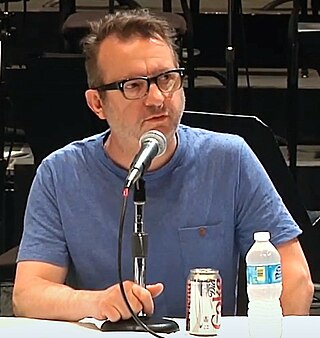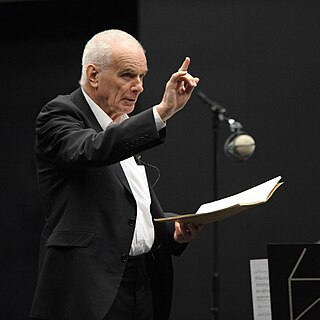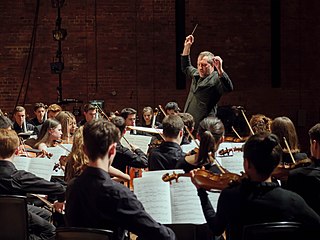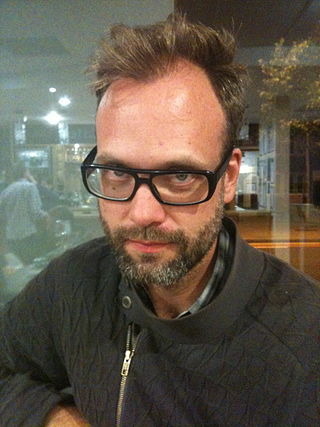Related Research Articles

Louis Joseph Andriessen was a Dutch composer, pianist and academic teacher. Considered the most influential Dutch composer of his generation, he was a central proponent of The Hague school of composition. Although his music was initially dominated by neoclassicism and serialism, his style gradually shifted to a synthesis of American minimalism, big band jazz and the expressionism of Igor Stravinsky.

Mark-Anthony Turnage is an English composer of contemporary classical music.

Sir Peter Maxwell Davies was an English composer and conductor, who in 2004 was made Master of the Queen's Music.

Evan Ziporyn is an American composer of post-minimalist music with a cross-cultural orientation, drawing equally from classical music, avant-garde, various world music traditions, and jazz. Ziporyn has composed for a wide range of ensembles, including symphony orchestras, wind ensembles, many types of chamber groups, and solo works, sometimes involving electronics. Balinese gamelan, for which he has composed numerous works, has compositions. He is known for his solo performances on clarinet and bass clarinet; additionally, Ziporyn plays gender wayang and other Balinese instruments, saxophones, piano & keyboards, EWI, and Shona mbira.

Thomas Joseph Edmund Adès is a British composer, pianist and conductor. Five compositions by Adès received votes in the 2017 Classic Voice poll of the greatest works of art music since 2000: The Tempest (2004), Violin Concerto (2005), Tevot (2007), In Seven Days (2008), and Polaris (2010).

Joby Talbot is a British composer. He has written for a wide variety of purposes, with a broad range of styles, including instrumental and vocal concert music, film and television scores, pop arrangements and works for dance. He is known, to sometimes disparate audiences, for quite different works.
Elodie Lauten was a French-born American composer described as postminimalist or a microtonalist.

The Classic BRIT Awards are an annual awards ceremony held in the United Kingdom covering aspects of classical and crossover music, and are the equivalent of popular music's Brit Awards. The awards are organised by the British Phonographic Industry (BPI) and were inaugurated in 2000 "in recognition of the achievements of classical musicians and the growth of classical music sales in the UK".
Julian Anderson is a British composer and teacher of composition.
Sarah Frances Beamish is a British composer and violist. Her works include chamber, vocal, choral and orchestral music. She has also worked in the field of music, theatre, film and television, as well as composing for children and for her local community.
Michael Blake is a South African contemporary classical music composer and performer. He studied in Johannesburg in the 1970s and was associated with conceptual art and the emergence of an indigenous experimental music aesthetic. In 1976 he embarked on 'African Journal', a series of pieces for Western instruments that drew on his studies of traditional African music and aesthetics, which continued to expand during two decades in London until he returned to South Africa in 1998. From around 2000 African music becomes less explicit on the surface of his compositions, but elements of rhythm and repetition remain as part of a more postcolonial engagement with material and form. He works in a range of styles including minimalism and collage, and now also forages for source material from the entire musical canon.
Joe Cutler is a British composer who grew up in Neasden and studied music at the Universities of Huddersfield and Durham, before receiving a Polish Government Scholarship to study at the Chopin Academy of Music in Warsaw, Poland. He has taught composition at the Royal Birmingham Conservatoire since 2000, and since 2005 he has been the Head of Composition there. In 2015 he was made Professor of Composition. He is also the co-founder of the instrumental ensemble Noszferatu.
Huw Thomas Watkins is a British composer and pianist. Born in South Wales, he studied piano and composition at Chetham's School of Music in Manchester, where he received piano lessons from Peter Lawson. He then went on to read music at King's College, Cambridge, where he studied composition with Robin Holloway and Alexander Goehr, and completed an MMus in composition at the Royal College of Music, where he studied with Julian Anderson. Huw Watkins was awarded the Constant and Kit Lambert Junior Fellowship at the Royal College of Music, where he used to teach composition. He is currently Honorary Research Fellow at the Royal College of Music.

Simon Bookish is the stage name of Leo Chadburn, a British musician and composer known for his work in experimental, electronic, pop, and classical music. His music has been broadcast on BBC Radio 1, BBC Radio 3, BBC Radio 6 Music, and Resonance FM. Originally from Coalville, Leicestershire, he moved to London and trained at the Guildhall School of Music and Drama from 1997 to 2001.
21st-century classical music is art music in the contemporary classical tradition that has been produced since the year 2000. A loose and ongoing period, 21st-century classical music is defined entirely by the calendar and does not refer to a musical style in the sense of Baroque or Romantic music.
Cevanne Horrocks-Hopayian is a British composer, singer, and harper. She is considered one of today's leading emerging composers.

Karen Tanaka is a Japanese composer.
Gabriel Prokofiev is a Russian-British composer, producer, DJ, and founder of the Nonclassical record label and nightclub. He has been nominated for two Ivor Novello Awards and his works have been performed internationally by orchestras such as BBC Philharmonic, St Petersburg Philharmonic, Seattle Symphony, Detroit Symphony, MDR Leipzig, Buenos Aires Philharmonic and Royal Seville Symphony Orchestra.
Joseph Phibbs is an English composer of orchestral, choral and chamber music. He has also composed for theatre, both in the UK and Japan. Since 1998 he has written regularly to commissions for Festivals, for private sponsors, and for the BBC, which has broadcast premieres of his orchestral and chamber works from the Proms and elsewhere. His works have been given premieres in Europe, the United States and the Far East, and he has received prestigious awards, including most recently a British Composer Award, and a Library of Congress Serge Koussevitzky Music Foundation Award. Many of his works have been premiered by leading international musicians, including Dame Evelyn Glennie, Esa-Pekka Salonen, Leonard Slatkin, Sakari Oramo, Vasily Petrenko, Gianandrea Noseda, and the Belcea Quartet.
Daniel Fardon is a British composer of contemporary classical music.
References
- ↑ "Happy Birthday: Sinan Savaskan, 57". The Times. 11 August 2011. Retrieved 19 May 2020.
- ↑ "Birthdays". The Guardian . Guardian News & Media. 11 September 2014. p. 43.
- 1 2 "Sinan Savaskan". Foundation for Contemporary Arts. Retrieved 19 May 2020.
- 1 2 "Sinan Savaskan | FCA Grant Recipient".
- ↑ "BIOGRAPHY". octandre-ensemble. Retrieved 19 May 2020.
composer-in-residence : Sinan Savaskan
- ↑ "Reviews". Sinan Savaskan. 21 April 2013. Retrieved 19 May 2020.
Sinan Savaskan's The Street treated a saxophone quartet ... more exhaustively, exploiting, a full range of possible effects and arriving at a tightly organised suite of movements with definite blues inflections at several points.
- ↑ "Pleasure to the end (even if you can't whistle the tune)". The Independent. 20 December 2000. Retrieved 19 May 2020.
- ↑ Service, Tom (19 December 2000). "Review: Stockhausen/AcoustICA". The Guardian. Retrieved 19 May 2020.
- ↑ "Variant | issue 8 | History of the LMC, Clive Bell". www.variant.org.uk. Retrieved 19 May 2020.
- 1 2 "Sinan Savaskan – Composer". www.composer.co.uk. 7 January 2005. Retrieved 19 May 2020.
- ↑ "Between the Ears". The Radio Times. 16 May 2002. p. 124. Retrieved 19 May 2020.
- ↑ "BBC Radio 3 – Hear and Now, 40 Years of Radio 3, Bergen Festival 2007". BBC. Retrieved 19 May 2020.
- ↑ "Hear and Now". The Radio Times. 18 October 2007. p. 138. Retrieved 19 May 2020.
- ↑ "Our Staff". Westminster School. Retrieved 12 January 2020.
- ↑ "ARTNET NEWS". Artnet Magazine News. artnet.com. 18 December 1998. Retrieved 19 May 2020.
- ↑ "Sinan Carter Savaskan: The Composers' Fund". PRS for Music Foundation. Retrieved 13 June 2024.
- ↑ "British Composer Awards 2015 nominees revealed". www.prsformusic.com. Retrieved 19 May 2020.
- ↑ "The Ivors Composer Awards 2015". The Ivors Academy. Retrieved 19 May 2020.
- ↑ "Oedipus the King". Camdram. Retrieved 19 May 2020.
- ↑ "Archive for Oedipus the King at Arts Theatre, Cambridge. 2004. [PLAY]". UK Theatre Web. Retrieved 19 May 2020.
- ↑ "Greek tragedy: setting the stage today". Research. University of Cambridge. 1 February 2008. Archived from the original on 12 February 2013.
- ↑ "Sinan Savaskan - Composer". www.composer.co.uk. Retrieved 13 June 2024.
- ↑ "Lisbon interludes: Vitor Gonçalves on The Invisible Life and A Girl in Summer | Sight & Sound". British Film Institute. 22 November 2016. Retrieved 19 May 2020.
- ↑ "Sinan C. Savaskan". MUBI. Retrieved 19 May 2020.
- ↑ "Classical and Jazz Executive". basca. Archived from the original on 5 September 2011.